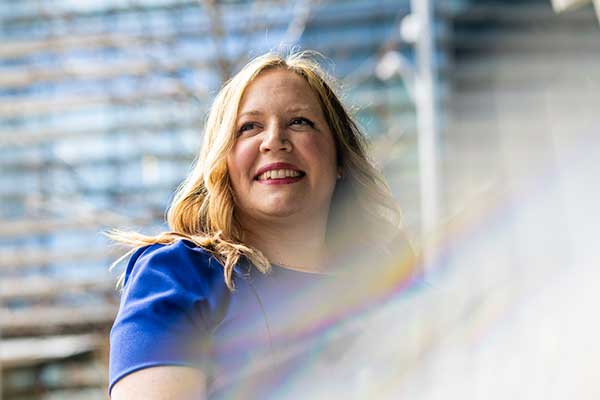‘You Have the Power to Make Change.’ Sustainability Trips to Brazil Earn Professor Northeastern’s First Global Educator Award

ChE Associate Teaching Professor Courtney Pfluger is the inaugural recipient of the Northeastern University 2023 Global Educator Award, which recognizes the contributions of faculty to students’ global learning and acknowledges and celebrates the value of these experiences to Northeastern’s students and to our mission as a global university. Honorees exhibit high-quality teaching that is engaging, supportive, inclusive, interculturally competent, and appropriately challenging; contributes to students’ global mindset; and has a positive impact on host communities. Pfluger was recognized for her work on developing and running a Dialogue of Civilizations program focused on sustainable energy in Brazil. Her work in offering global experiential learning opportunities to Northeastern students while incorporating global sustainability issues with a focus on local, global, and cultural contexts is impactful. She will be recognized by the University at the Academic Honors Convocation on April 20.
This article originally appeared on Northeastern Global News. It was published by Ian Thomsen. Main photo: Courtney Pfluger, an associate professor of chemical engineering, was honored for leading engineering students on Dialogue of Civilizations visits to Brazil, where they focus on sustainable energy. Photo by Alyssa Stone/Northeastern University
It began 11 years ago when Courtney Pfluger, a new professor at Northeastern, discovered that 80% of Brazil’s energy grid was drawn from sustainable sources—compared to 10% in the U.S. at that time. One step of inquiry after another led the associate teaching professor and a cohort of engineering students on the first of many Dialogue of Civilizations expeditions to Brazil.
One decade into her ambitious journey, Pfluger has been honored with Northeastern’s inaugural global educator award.
“I’m really passionate about sustainability and teaching the students that they have a role in the world’s future,” Pfluger says. “I tell the students that I want to help empower you, that you don’t have to sit around while you watch all of these things happen in our society and feel helpless. You have the power to make change.”
Pfluger’s work to advance global experiential learning stood out among a field of highly qualified candidates from across the university, said Ken Henderson, chancellor and senior vice president for learning at Northeastern.
“Professor Pfluger’s passion lies in teaching engineers to examine global sustainability issues through local, global and cultural lenses,” Henderson says. “It was her work on developing meaningful cooperative partner projects that made her nomination stand out.”
Pfluger has led students on nine Dialogue of Civilizations visits to Brazil since 2013. A traveling party of 16 to 24 students lives, learns and works together in Brazil for more than five weeks while focusing on sustainability issues.
“Among engineers, including me with my chemical engineering background, there is a focus on innovation and doing new things, but a lot of times it has to do with the design and the technical know-how,” Pfluger says. “What I felt was missing from a lot of conversations we were having as engineers—and specifically first-year students—was this connection between engineering and how it can affect society, which includes the environment.”
Why Brazil? She believed the exposure would inspire her students in all kinds of ways.
“I picked Brazil because it was a developing country,” Pfluger says. “I wanted the students to see the differences in the socio-economic backgrounds of the people in Brazil. We need to be understanding how what we are doing affects people that maybe don’t have the same status that we do. And that is much more apparent in Brazil than it would be in potentially some of these other countries.”
During visits, Pfluger encourages students to take note of impoverished neighborhoods.
“The students will have emotional responses to certain things,” Pfluger says. “If you’re talking about it in the classroom, it’s not going to have that same impact as actually seeing how certain people live—and how decisions made by people who don’t live in that neighborhood have such a big effect.”